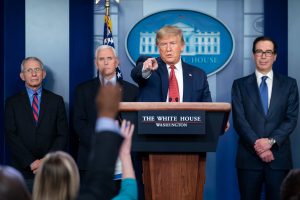While anti-Chinese sentiment has a long history in the United States, it has never been a part of my personal Chinese-American experience, which now spans seven decades. On the contrary, I found most Americans, especially World War II veterans who had served in the Pacific, to be extremely welcoming to me and my fellow Chinese-Americans after I arrived in 1949 as a student. It was at the encouragement of a U.S. immigration officer that I committed to staying in the United States after I finished my degree at the University of Maryland in 1956, believing that through remaining in the United States I could help bring about a better future for the U.S.-China relationship.
For over 60 years, I did just that. Through my work at the Library of Congress, I helped facilitate library and people-to-people exchanges between the United States and the People Republic of China. As an instructor for the State Department and as a professor at Georgetown University, I taught hundreds of students and young professionals about China and U.S.-China relations. Through fostering these people-to-people ties and by encouraging greater understanding about China in the United States, I believed I was helping to create a more stable U.S.-China relationship rooted in mutual respect and cooperation instead of misunderstanding and suspicion.
It is in this context that I find Trump’s “Chinese virus” rhetoric so disappointing. While he may not believe that he is being racist by using this name for the virus, he is damaging bridges that took decades to build. Chinese officials are latching onto this rhetoric as justification for not cooperating with the United States. It is also isolating the United States from the international community and hampering the direly-needed multilateral response to the virus and economic crisis. A G-7 joint statement about the virus collapsed after the United States insisted on calling it the “Wuhan virus.” If the G-7 was unable to reach a consensus over the issue, what are we to expect of the upcoming G-20 teleconference, in which Xi Jinping has pledged to participate?
While racism and cultural insensitivity may be one explanation for Trump and his administration’s insistence on calling the virus “Chinese” or “Wuhan,” it is clearly also politically motivated. Trump called the virus “coronavirus” in the early stages of the epidemic, when cases were largely limited to China. He only doubled down on the “Chinese virus” label when the virus had started to spread in the United States, and when the media began to criticize his initially slow response. Calling the virus “Chinese” served two purposes for Trump: first, it affixed blame for the crisis on China instead of the administration; second, it gave the media something to focus its ire on instead of the government’s response to the virus itself.
The latter has been a tried and true strategy for the Trump administration. As Adam Serwer wrote in The Atlantic this week, “Trump and his acolytes are never more comfortable than when they are defending expressions of bigotry as plain common sense, and accusing their liberal critics of being oversensitive snowflakes who care more about protecting ‘those people’ than they do about you. They seek to reduce any political dispute to this simple equation whenever possible.” Trump is most in his element when he is confronting criticism of his own behavior. Calling the virus “Chinese” enables him to shape what the media is criticizing him over and to distract from the government’s broader effort to combat the virus.
Trump’s “Chinese virus” rhetoric may be helping him politically, but it is diplomatically crippling the United States. The world is watching the United States argue over nomenclature as shortages of medical supplies in the nation’s hospitals persist. Meanwhile, China is claiming victory over the virus and is sending aid around the world, and Xi is rallying G-20 leaders around the necessity of international cooperation.
U.S.-China cooperation is essential as the coronavirus pandemic continues to unfold and the full extent of its economic repercussions become clear. Efforts to address the crisis at a global level — laws to end dangerous wet markets, cooperation over vaccine research, and agreements over measures to stabilize the global economy — will be dependent on the ability of the leaders and diplomats in the United States and China to get past the finger-pointing and recognize their mutual interests. Dropping the “Chinese virus” rhetoric will not solve these problems, but it is an easy way for the Trump administration to begin to reverse criticisms — at home and abroad — about its response to the pandemic.
Dr. Chi Wang is President of the U.S.-China Policy Foundation and previously served as the head of the Chinese section at the Library of Congress.

































